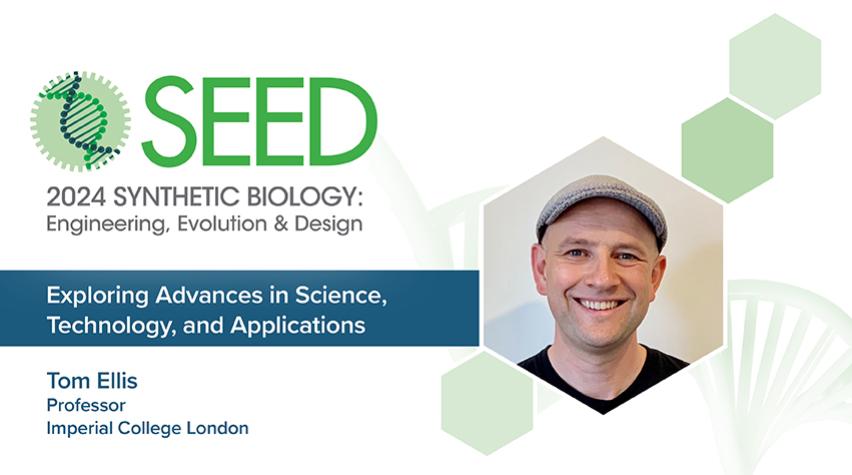
Organized by AIChE’s Society for Biological Engineering (SBE), the 2024 Synthetic Biology: Engineering, Evolution & Design (SEED) Conference will be held June 24–June 27 in Atlanta, GA, USA. Covering the field from its foundations to its commercial applications, SEED’s expert-led sessions offer insights into next-generation development strategies, incorporating perspectives from research institutions and industry. Reserve your spot by April 29 for best rates. Funding opportunities are also available to attend this event.
We caught up with keynote speaker Tom Ellis, Professor at Imperial College London, to discuss synthetic biology and its applications, the future of synbio, and what he’ll be speaking about at SEED.
What inspired you to do research in this field?
It’s sort-of hardwired into me to want to write DNA and understand genomes by writing and rearranging them. As a teenager, I lived in Cambridge, England, so in my formative years, DNA-themed statues were everywhere. My first weekend job for extra money while at school was actually loading DNA gels for the Human Genome Project.
I was fascinated with all this DNA sequence that was coming from the gels and was staggered to hear from my boss that most of it didn’t code for anything useful. My parents didn’t tolerate me leaving junk all around my bedroom, so how come my genome was full of it? That didn’t seem right. Once I saw synthetic biology emerging in the early 2000s, it just clicked with my interests perfectly because it was the place in science where people were arranging DNA sequences logically like programs, and this would surely one day lead to people being able to make nice, well-organized genomes that we understand (and that our parents won’t complain about).
And now, 20 years since I took a jump into synthetic biology, DNA synthesis and assembly can allow us to write entire microbial synthetic genomes. Myself and others are now exploring how synthetic genomes can be written and arranged more logically and with as much junk removed as possible too.
How do you envision this field solving some of the challenges in engineering and society?
Almost all of the main challenges and opportunities for humans and our planet involve working with biology, whether that is for health, sustainable manufacturing, food, energy, materials, and even well-being. So, it makes sense that we need to understand how biology works and how we can improve it to match these big challenges.
Using synthetic biology to better understand and improve genomes is going to be a game-changer when we can do it at scale, and it will eventually benefit everyone who is working to use biology and biotechnology to solve problems. The field of my talk, synthetic genomics, is firmly in the long vision, deep-tech camp and so the best applications could be decades away, but I have no doubt that by the end of this century it’ll be a core part of how we’re getting biology to solve all of our challenges.
Are there any new developments, technologies, or applications of technologies in this field that you are particularly excited about?
New technologies always excite me the most in research, and in synthetic genomics. There have been some great new tools in the last few years that are changing the way we work in my group. We thought CRISPR was pretty good, but Prime Editing really opens new ways to make synthetic genomes without needing to buy so much synthetic DNA. We’re also seeing lots more DNA recombinases coming available, and soon I expect we will be able to just design or select ones to be efficient at delivering DNA into hundreds of existing sites in genomes. Long-read nanopore sequencing is also becoming a bigger and bigger tool in my research. In fact, we’ve been working on a few methods to make it targeted so we can use it in everyday experiments to get a lot more data every time we make and test things.
Lastly, the most exciting new technology is the arrival of generative language models for writing DNA. These can feel like voodoo when you get one to write you a promoter and it just writes every base out and the sequence works the first time. It’s clear that they are going to change everything when it comes to making synthetic genomes in the future.
What is the one big takeaway that you would like audiences to gain from your talk?
A key theme to my talk is that, thanks to CRISPR, regions of genome can now be edited and reorganized more logically, and that all sorts of benefits come quickly from doing this. You don’t need to wait for an entire synthetic genome to be completed in order to do cool things like using SCRaMbLE to rearrange and delete genes. And once sets of genes are arranged in modules, you can do all sorts of things much more easily, like switching entire cell functions on and off with a simple control switch.
I really want to enthuse more people to work in this area in all organisms. It’s exciting, it’s not as difficult as you might think, and it asks and answers very interesting scientific questions. Plus, the more people working on it, the quicker we will get to modular, minimal genomes that we can fully model on computers. Everyone in this field wants that.
We may receive funding to help sponsor some registrations for SEED 2024. U.S.-based students, post-docs, and early-career professionals are encouraged to apply for a grant.
About SBE
Established in 2004, the Society for Biological Engineering is a technological community for engineers and applied scientists integrating biology with engineering. Members of SBE come from a broad spectrum of industries and disciplines and share in SBE’s mission of realizing the benefits of bioprocessing, biomedical and biomolecular applications. Learn more about SBE.


